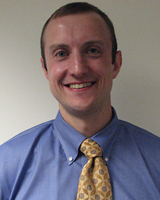Eric Schmidt, M.D.  Eric Schmidt, M.D.
Assistant Professor, Division of Pulmonary Sciences and Critical Care Medicine, University of Colorado, Denver, Colorado
Molecular Physiology Core Applied to Acute Lung Injury
Administered by the NHLBI Division of Cardiovascular Sciences, Heart Development and Structural Diseases Branch
FY 2009 Recovery Act Funding: $527,802
Although Eric P. Schmidt, M.D., is just starting his career studying severe lung disease, this physician-scientist has wanted to be a doctor as long as he can remember. Because his father had serious medical problems, the young Dr. Schmidt spent a lot of his childhood roaming around hospitals. Fortunately, his dad got better - and is doing well today. But the experience had a lasting impact, steering Dr. Schmidt to where he is now.
"When you're a kid, every experience shapes you," said Dr. Schmidt, whose father was a steelworker and mother was a teacher. "Growing up, I saw my dad's doctors as real people - having fun and doing normal things like eating in the hospital cafeteria. When they just said a couple of words to me about my dad, they made me feel a lot better."
Today, Dr. Schmidt feels lucky that he can do the same for his own intensive-care unit patients and their families, but he is also a passionate medical researcher with an insatiable appetite for uncovering new knowledge about the human body.
"Scientific discovery is a great thrill," Dr. Schmidt said, "but I always have an eye on the need to bring science to the sick patients who need it most."
Research Focus: Dr. Schmidt was recently recruited to join a team of doctors who study and treat severe lung diseases at the University of Colorado in Denver. His expertise is an unusual blend of basic and clinical research. During his training, Dr. Schmidt developed animal models to study acute lung injury, a life-threatening condition in which the lungs get flooded with blood and other fluids. Acute lung injury can be triggered by a wide range of stresses to the body and kills a third of the people who develop it. The rest remain sick, and many never return to work.
Researchers first recognized acute lung injury in 1967 during the Vietnam War, when then-new resuscitation techniques saved soldiers from bleeding to death but left their lungs severely damaged. Little progress has been made in the 40 years since, Dr. Schmidt lamented, noting that treatment today still relies on critically ill patients "waiting it out in the intensive-care unit" while doctors adjust the settings on breathing machines to minimize organ damage.
Grant Close-Up: Something has got to give, Dr. Schmidt urged. His plan is to understand how sepsis - a dangerous body-wide condition that leads to organ failure and death - causes lung vessels to leak. Sepsis is a common trigger for acute lung injury. Dr. Schmidt's research focus is the glycocalyx, a coating of natural sugar molecules that lines the inside of blood vessels. In healthy cells, this sugary layer serves as a barrier to fluid loss. Researchers believe that in acute lung injury, the glycocalyx gets stripped off, leaving the vessels vulnerable to continued damage. Dr. Schmidt is studying how sepsis affects the glycocalyx, in mice.
Discovery for Recovery: An expert in small-animal surgery, Dr. Schmidt has used Recovery Act funds to purchase a customized microscope that can view lung vessel linings in mice with sepsis. He has also developed a unique device to examine the function of tiny diseased mouse lungs outside their bodies, in a special chamber that circulates blood and fluid just like the body does. He is also trying to adapt a microscope to be able to measure how much oxygen is in the lung vessels, in a living mouse in real time.
Dr. Schmidt emphasized that all these studies are being done for the benefit of understanding human disease, and one day he hopes the techniques will be used in people.
A Championship Team: Dr. Schmidt is thrilled to be part of a truly collaborative group of scientists at the University of Colorado and other Denver area hospitals that participate in medical research. Their focus is on translational medicine - bridging the gap from lab findings to patient care - and they are involved in every NHLBI clinical research network related to lung diseases.
"Nobody hides in their labs," Dr. Schmidt said. "We all combine our strengths to work together for the benefit of patients."
By Alison Davis, Ph.D. Last Updated:August 10, 2010 |

![]() View videos of principal investigators
View videos of principal investigators
![]() Read scientists' profiles
Read scientists' profiles
![]() Read testimonials from researchers
Read testimonials from researchers

















 Twitter
Twitter
 Facebook
Facebook YouTube
YouTube